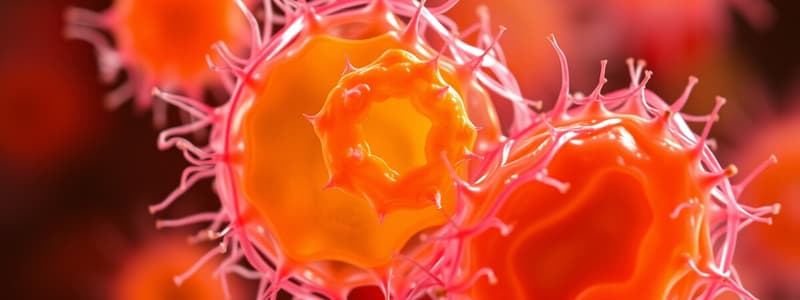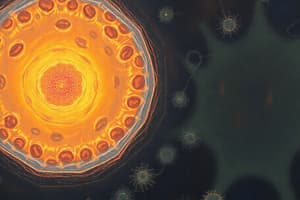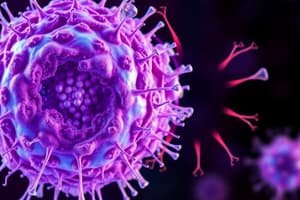Podcast
Questions and Answers
Which of the following features is unique to prokaryotic cells?
Which of the following features is unique to prokaryotic cells?
- Membrane-bound organelles
- Larger in size
- Nucleus
- Bacteria (correct)
Which of the following structures are found only in eukaryotic cells?
Which of the following structures are found only in eukaryotic cells?
- Cytoplasm
- Ribosomes
- Nucleus (correct)
- Circular chromosomes
What type of chromosomes do prokaryotic cells have?
What type of chromosomes do prokaryotic cells have?
Circular chromosomes
Eukaryotic cells have smaller sizes compared to prokaryotic cells.
Eukaryotic cells have smaller sizes compared to prokaryotic cells.
Both prokaryotic and eukaryotic cells contain ______.
Both prokaryotic and eukaryotic cells contain ______.
Match the following cellular characteristics with the correct cell type:
Match the following cellular characteristics with the correct cell type:
Flashcards are hidden until you start studying
Study Notes
Prokaryotic Cells
- Evolved first in the timeline of cellular life.
- Primarily represented by bacteria, which are unicellular organisms.
- Generally smaller in size compared to eukaryotic cells.
- Lack membrane-bound organelles, leading to simpler cellular structures.
- Contain circular chromosomes that are organized differently than linear chromosomes.
Eukaryotic Cells
- Characterized by the presence of a plasma membrane that encloses the cell.
- Feature a nucleus, which houses genetic material and separates it from the cytoplasm.
- Include both plant and animal cells, indicating greater structural diversity.
- Generally larger in size relative to prokaryotic cells.
- Possess specialized membrane-bound organelles, such as mitochondria, which assist in energy production.
- Contain linear chromosomes, which are more complex and organized for cell division.
Similarities Between Prokaryotic and Eukaryotic Cells
- Both cell types contain cytoplasm, a gel-like substance where cellular processes occur.
- Both have DNA as their genetic material, essential for inheritance and cellular function.
- Ribosomes are present in both, playing a crucial role in protein synthesis, though they differ in size and structure between the two types.
Studying That Suits You
Use AI to generate personalized quizzes and flashcards to suit your learning preferences.




